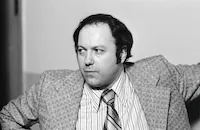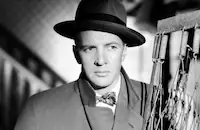Deadhead Miles
Brief Synopsis
Cast & Crew
Vernon Zimmerman
Donna Anderson
Alan Arkin
Madison Arnold
Paul Benedict
Patricia Campbell
Film Details
Technical Specs

Synopsis
Trucker Cooper and three accomplices stop a semi truck filled with carburetors, kill the driver, then repaint the truck and change its identification numbers. Cooper and his partner plan to drive the truck and sell off the carburetors, but Cooper, a volatile, erratic hillbilly, locks his partner in a store and flees alone. Thrilled, Cooper crows to a blowup doll sitting in the passenger seat. In Virginia, he picks up a hitchhiker, who hides his alarm at Cooper's aggressive driving. Later in a bar, Cooper strikes up a conversation with a hotheaded, mean trucker dubbed "The Duke of Interstate 40," ignoring the man's disinterest. Cooper, who passes the hours by keeping abreast of current events on radio programs, stops with the hitchhiker at a drive-in, where they watch the film without sound and discuss the existence of Jesus. Cooper states that he once tested Jesus by putting pieces of a broken clutch under his truck overnight to see if he would fix them, but in the morning, the clutch was still broken. In a hardware store farther down the highway, Cooper asks with studied nonchalance whether the owner would like 14,000 carburetors, and although his efforts are unsuccessful, the hitchhiker has negotiated with a farmer and the owner of a brick plant to transport two additional loads: pipes and chickens. Hoping not to have to leave the truck until they can unload, they steal some junk food and soda to consume along the way. While driving, Cooper coaches the hitchhiker about how to throw empty soda bottles out the window to hit targeted signs. In one town, Cooper freshens up, buys flowers and brings the hitchhiker to a trailer park to visit his wife, but finds that she has left without word. Cooper's haphazard driving frequently attracts the attention of the police, to whom the driver gives a variety of colorful excuses. In another town, Cooper visits an old flame, Donna James, and awkwardly begins making love to her. When he takes off her top, however, he sees that someone has attached a harness and leash to her, and realizing that she has become mentally incompetent, he wraps her back up tenderly. That night, Cooper, who does not want to pull off the road to sleep, begins to nod off while driving. This time, a policeman pulls him over and checks his logbook, then notes that his license plates are irregular. Even though Cooper claims to have leased the truck, the policeman instructs him to unload four tons of cargo onto the side of the road, where his cohorts can pick it up later for illegal resale. Cooper and the hitchhiker dump out some chickens and pipes and move on, unaware that they have left the truck's back door open, spilling pipe out behind them as they speed away. Later, when the truck stalls, Cooper leaves to walk back to town, after which the hitchhiker is awoken from a nap by a man wearing all black and driving a truck whose entire body and windows are painted black. Introducing himself as Johnny Mesquitero, the man diagnoses "overdriving" and fixes the engine. As he leaves, he warns the hitchhiker that they must take ten pounds of pressure off the front tires, or will risk jackknifing. When Cooper returns, he identifies Johnny as a trucker who died years earlier in a jackknife accident, who is alleged to help out drivers along the highway. At a diner that evening, Cooper learns that the police are looking for him, and when he approaches a weighing station the next day, he devises a scheme to evade having his extra cargo impounded. To that end, he enters the station screaming that his partner is drunk and trying to kill him. He tells the policemen inside to drive down the road to investigate, and when they attempt to take Cooper along, he insists that he is too afraid, forcing the police to leave him behind with an inexperienced patrolman. In the office, Cooper easily outwits the man by claiming to hear a noise outside, then knocks him out, steals his gun and runs back to the truck. He and the hitchhiker reach a detour, but Cooper ignores the signs and follows the closed road out of the state, where they celebrate their escape from the law at a roadside diner. The next day, they attend stock car races in Fontana, California. The hitchhiker asks Cooper for money with which to gamble, but Cooper refuses, then loses all his wagers. Back on the road, the hitchhiker loads a gun and levels it at Cooper, demanding his money. Unperturbed, Cooper reveals that he has only $19, as he buried his fee back in Tennessee. The hitchhiker insists on combing through Cooper's belongings, and when he climbs into the back of the truck, Cooper overpowers him and locks him in the back. Cooper drives off, stopping in a bar, where a drunken barfly drops her glass eye into her beer, winning a bet that she can look at him from the bottom of her glass. Having failed to sleep for the past eighty-four hours, Cooper veers all over the road as he drives, almost killing a couple. Finally, he parks the truck at a barn and releases the hitchhiker, who first apologizes, then attacks Cooper. Cooper punches him, unhooks the cab and drives off. Unable to sell it to a used-car salesman, Cooper leaves it behind, hitchhiking down the road.

Director
Vernon Zimmerman
Cast
Donna Anderson

Alan Arkin
Madison Arnold
Paul Benedict
Patricia Campbell
Oliver Clark
Patrick Dennis-leigh
William Duell

Charles Durning
Hector Elizondo
Hal England
Virgil Frye
Roy Galvin
Ted Gehring
Phillip Kenneally
Richard Kiel
Judy Lynn Marlow
Bill Mccutcheon

John Milius
Joyce Perry
Virginia Peters
John Quade
Dan Resin
Avery Schreiber
Diane Shalet
Shane
Loretta Swit
Anne Willis
Stuart Wilson
Morgan Windbiel
Larry Wolf

George Raft

Ida Lupino
Barnard Hughes

Allen Garfield
Bill Littleton
John Stedman
Tom Waters

Bruce Bennett
Crew
Ted Berkeley
John Bill
Tony Bill
Jack Bohrer
Fred Brost
Richard Brunno
David Dockendorf
Quinn Donoghue
Dave Dudley
Deena Goldstone
Danford B. Greene
Paul Hager
Jimmie Haskell
Hannah Hempstead
George Hively
Jerry Kennedy
Charles Knight
Jeanetta Lewis
Bill Littleton
Joe Madrid
Terrence Malick
Cornelia Mcnamara
Eve Newman
John Prizer
Spencer Quinn
Bud Smith
The Jordanaires
Russell Vreeland
Beverly Walker
Ralph Woolsey
Vernon Zimmerman

Film Details
Technical Specs

Quotes
Trivia
Notes
In the print viewed, the first few credits were missing and many of the character names in the closing cast credits were illegible. Although the onscreen credits include a copyright statement for Paramount Pictures Corporation, the film was not registered for copyright. A written staetment in the credits reads: "Special thanks to Peterbilt Trucks for their cooperation." During the drive-in movie sequence, scenes from the 1950 Paramount release Samson and Delilah (see below) are shown on the screen. In one scene of Deadhead Miles, George Raft and Ida Lupino make cameo appearances, recreating a scene from their 1940 Warner Bros. film They Drive by Night (see below).
Deadhead Miles marked the first completed feature film for producer Tony Bill and producer-director Vernon Zimmerman, as well as writer and future director Terrence Malick. It was also the first and only production of Bill's production company, Biplane Cinematograph, Inc. A February 1971 Los Angeles Times article on the production noted that Bill first conceived of Deadhead Miles, named for the term truckers use for a return trip in an empty, nonpaying truck, while listening to country music songs, and that Malick knew a truck driver like "Cooper."
According to a July 31, 1970 Daily Variety news item, Deadhead Miles was originally developed by Warner Bros., but the studio then dropped the property. According to the Los Angeles Times article, Paramount gave the producers a budget of under $1 million and allowed them almost complete artistic freedom. Zimmerman, as noted in the Variety review, described Deadhead Miles as having its roots in German Expressionism.
As noted in contemporary news items and press materials, the picture was shot entirely on location, including in Knoxville and Nashville, TN, Madrid and Santa Fe, NM, and Chino, CA. News items and reviews credit Tom T. Hall with writing the score, but only Jimmie Haskell is credited onscreen. The Los Angeles Times article reported that star Alan Arkin had previously directed co-star Paul Benedict in two off-Broadway productions.
Despite Bill's assertion in the Los Angeles Times article that Deadhead Miles would make Malick "the most sought after young writer in the country," the script's episodic, absurdist nature prompted the studio to pull the finished film from release. Zimmerman stated in a March 1985 Hollywood Reporter article that the release was stalled because Paramount changed management. Several times over the following decade, various supporters of the film attempted to speed its release. A July 1976 Los Angeles Times article described the efforts of production manager Paul Hager and assistant sales manager Gerry Haile, who, according to the article, had convinced then-head of Paramount Barry Diller to re-consider the film's release. After the pair, along with editor George Hively, added some footage and "retooled" the soundtrack, a test-screening in Omaha was scheduled on August 13, 1976. The film did not receive another screening, however, until 1982, when it was shown at the San Diego Film Festival, then screened on October 31, 1982 at the Hof Film Festival in Germany.

Miscellaneous Notes
Released in United States Winter January 1, 1982
Released in United States March 1985
Ida Lupino makes a guest appearance in the film.
"Deadhouse Miles" was originally shot in 1972 and was released ten years later in 1982.
Released in United States Winter January 1, 1982
Released in United States March 1985 (Shown at FILMEX: Los Angeles International Film Exposition (Special Programs Rediscovery) March 14-31, 1985.)











